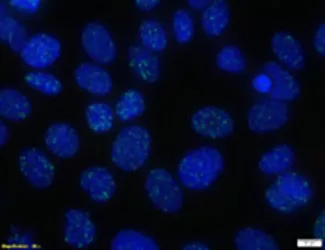Theme Leads: Professor of Cancer Genomics and Dr James Brown
Our cells are constantly subjected to both endogenous and exogenous agents which can directly (or indirectly) cause DNA damage and alter genomic integrity (including both genetic and epigenetic changes). A fundamental hallmark of cancer is Genomic instability, which is both a cause and a consequence of the molecular evolution driving tumorigenesis.
Our researchers focus on understanding the alterations found in cancer cells that dysregulate molecular mechanisms essential for protecting genomic integrity (such as DNA damage repair, apoptosis induction, cell cycle control) and integral to tumour cells.
Defining these new molecular effectors and pathways which maintain genomic stability, and understanding the functional consequences of their dysregulation in cancer cells (and connected cellular processes and signalling), provides fresh insights into mechanisms driving genomic instability in many tumours. An improved understanding of the role of molecular processes protecting genomic integrity (dysregulated in cancer cells) provides an opportunity to exploit this knowledge allowing us to develop new treatments or strategies to target cancer cells reliant on these alterations for survival.
A) Understanding changes in DNA damage response signalling in tumour cells
Our ambition is more precisely define specific DNA damage repair mechanisms and pathway’s involved in the repair of double strand DNA breaks. Dr Browns groups has a focus on better understanding the role of lysine acetyltransferases in the DNA double strand break response.
B) Developing targeted therapeutics
Defining molecular changes that alter genomic stability in cancer cells provides an opportunity develop new therapeutics targeting these changes in cancer cells. Dr Browns group is focused on the development and validation of lysine acetyltransferase inhibitors (KATi). KATi are an exciting new class of drugs showing great promise for the targeted treatment of many tumour types.
C) Biomarker discovery and validation.
In conjunction with the development of targeted cancer-specific treatments, there is a need to discover and validate new biomarkers that allow improved patient stratification, diagnosis and prognosis. The development of biomarkers matched to new treatments will improve both the utilisation and effectiveness of these treatments.
In the short term our goal is to use currently available lysine acetyltransferases inhibitors to better understand the temporal and individual roles of KAT in mediating the DNA double strand break response (DSBR) and to better understand the contribution and role of lysine acetyltransferases in mediating tumour cell evolution and survival. Many previous investigations improving our understanding of the role of KATs in the DSBR was limited, as key KATs are essential for cellular survival. Using newly devloped KATi to inhibit activity provides a precise and tuneable method for modulation of KAT activity, which allows closer inspection of the role and timing of KAT dependent signalling events not previously possible.
In the medium term our objective is develop new, and improve current, KATi to improve their bioavailability and efficacy. Furthermore, additional research is needed to determine which tumour types will be most sensitive to targeted inhibition of KATs. As KATi are a new developing class of inhibitors, a key research goal is to determine which tumour types or diseases will benefit the most of targeted KATi treatment.
Our long term our ambition is to develop new therapeutic approaches and biomarkers with potential clinical applications. KATi have the potential to become a mainstream therapeutic tool (similar to HDAC inhibitors), and our aim is to develop both KATi and related biomarkers to advance KATi towards near-future applications in human disease. Our goal is to further explore the ability of KATi to enhance the efficacy of current therapeutic treatments, facilitating improved efficacy of current treatments combined with reductions in unwanted adverse events associated with treatments.
McGuire A, Casey MC, Shalaby A, Holian E, Kalinina O, Curran C, Webber M, Callagy G, Bourke E, Kerin MJ. Brown JA. Quantifying Tip60 protein level stratifies breast cancer. Scientific Reports. 2019. 9:3819. DOI:10.1038/s41598-019-40221-5. PMID:24947938.
Gao C, Bourke E, Scobie M, Famme MA, Koolmeister T, Helleday T, Eriksson LA, Lowndes NF, Brown JA. Rational design and validation of a Tip60 histone acetyltransferase inhibitor. Scientific Reports. 2014. 20;4:5372. https://doi.org/10.1038/srep05372. PMID: 24947938.
Brown J.A.L., Hancock W. Chapter 6: Acylases: Inhibitors Of Acetylation, Crotonylation, Butyrylation And Propionylation. Epigenetic inhibitors and their use in treating human diseases. Epigenetics And Epigenetic Inhibitors. Wiley & Sons. 2020 (In Press).
Brown JA., Patent Spotlight: Acetylation targeting drugs. Pharmaceutical Patent Analyst. Online: 3 Feb. 2020. https://doi.org/10.4155/ppa-2019-0025
